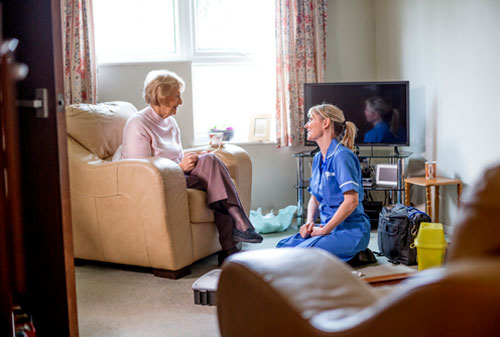




Responsible and responsive services aim to find ways of balancing their duties as employers with supporting individuals to live the lives that are suitable for them.
Positive risk-taking is about individuals taking control of their own lives by weighing up the potential benefits and harms of exercising one choice of action over another. Positive risk-taking is not ignoring any potential risks. Risk is a part of everyone’s everyday life, and everyone has the right to take risks.
Individuals must be given the support they need to take the risks they want and to make informed choices. New experiences and greater community involvement potentially involve individuals taking risks that offer opportunities for the development of independence, confidence, well-being, voice and autonomy.
Mae gwasanaethau cyfrifol ac ymatebol yn ceisio dod o hyd i ffyrdd o gydbwyso eu cyfrifoldebau fel cyflogwyr â'r gwaith o helpu unigolion i fyw eu bywydau mewn ffordd sy'n addas iddyn nhw.
Mae cymryd risgiau cadarnhaol yn golygu bod unigolion yn cymryd rheolaeth dros eu bywydau eu hunain drwy bwyso a mesur manteision a niweidiau posibl dewis un ffordd o weithredu yn hytrach na ffordd arall. Nid yw cymryd risgiau cadarnhaol yn golygu anwybyddu unrhyw risgiau posibl. Mae risg yn rhan o fywyd pob dydd pawb, ac mae gan bawb hawl i gymryd risgiau.
Rhaid rhoi'r cymorth sydd ei angen ar unigolion i gymryd y risgiau y maent am eu cymryd ac i wneud dewisiadau ar sail gwybodaeth. Gallai profiadau newydd a chynnydd yng nghyfranogiad y gymuned olygu y bydd unigolion yn cymryd risgiau mewn ffyrdd sy'n cynnig cyfleoedd i feithrin annibyniaeth, hyder, llesiant, llais ac ymreolaeth.

Providing real choice and control for individuals accessing health and social care means enabling individuals to take the risks they choose. Everyone has the right to take risks and make choices but if an individual has a more limited understanding of the risks involved in an activity they wish to participate in, they must be supported to make informed decisions.
When we look at risks, we should do so in relation to individuals' strengths, abilities and support networks. Everyone should have the right to make choices about their lives, so it is important to work out whether a risk is significant, and whether it is likely to happen.
Health and social care settings must be able to demonstrate that a risk-assessing process, a process of thinking things through properly, involving the individuals and others who know them, has taken place. This may or may not result in a formal written risk assessment.
Mae rhoi dewis a rheolaeth go iawn i unigolion sy'n defnyddio gwasanaethau iechyd a gofal cymdeithasol yn golygu galluogi unigolion i gymryd y risgiau a ddewisir ganddynt. Mae gan bawb hawl i gymryd risgiau a gwneud dewisiadau, ond os oes gan unigolion ddealltwriaeth fwy cyfyngedig o'r risgiau sy'n gysylltiedig â gweithgaredd y maent am gymryd rhan ynddo, rhaid eu helpu i wneud penderfyniadau ar sail gwybodaeth.
Pan fyddwn yn ystyried risgiau, dylem wneud hynny mewn perthynas â chryfderau, galluoedd a rhwydweithiau cymorth unigolion. Dylai fod gan bawb hawl i wneud dewisiadau ynglŷn â'u bywydau, felly mae'n bwysig canfod p'un a yw risg yn sylweddol, a ph'un a yw'n debygol o ddigwydd.
Rhaid i leoliadau iechyd a gofal cymdeithasol allu dangos bod proses asesu risg, sef proses o bwyso a mesur pethau'n ofalus, gan gynnwys yr unigolion a phobl eraill sy'n eu hadnabod, wedi digwydd. Mae'n bosibl y gall hyn arwain at lunio asesiad risg ysgrifenedig ffurfiol.

The following are occasions when a risk assessment should be completed:
In addition, there should be a system for regularly reviewing the risk assessments. No risk assessment should be written without a review date, monthly, quarterly, six monthly or annually, depending upon the need. This practice ensures an individual has full control, responsibility and voice over decisions affecting them, utilising good practice in the form of individual centred approaches.
A risk assessment is carried out, then the individual is informed and guided in weighing up the risk with the benefit, or drawbacks, from undertaking the identified activity. Health and social care workers support individuals to balance their rights, the risks and their responsibilities.
Dylid cwblhau asesiad risg ar yr achlysuron canlynol:
Hefyd, dylid bod system ar gyfer adolygu'r asesiadau risg yn rheolaidd. Ni ddylid ysgrifennu unrhyw asesiad risg heb gynnwys dyddiad adolygu, boed yn fisol, yn chwarterol, bob chwe mis neu'n flynyddol, yn dibynnu ar yr angen. Mae hyn yn sicrhau bod gan unigolyn reolaeth, cyfrifoldeb a llais llawn dros benderfyniadau sy'n effeithio arno, gan ddilyn arfer da ar ffurf dulliau gweithredu sy'n canolbwyntio ar yr unigolyn.
Cynhelir asesiad risg, wedyn caiff yr unigolyn ei hysbysu a'i arwain wrth bwyso a mesur y risg a'r manteision, neu'r anfanteision, sy'n gysylltiedig â chyflawni'r gweithgaredd dan sylw. Mae gweithwyr iechyd a gofal cymdeithasol yn helpu unigolion i gydbwyso eu hawliau, y risgiau a'u cyfrifoldebau.

For many individuals taking risks is a part of everyday life. However, individuals with a disability, mental health illness and older individuals for example, are not always encouraged to take risks. This might be because of their perceived limitations or fear that they or others might be harmed. Changes in society’s attitude towards disability, social care and health issues now means that individuals are being encouraged to increase their independence in their daily activities and decisions about the services they receive. The focus is now more on enhancing individuals’ abilities rather than concentrating on their disabilities and the things they cannot do.
I lawer o unigolion, mae cymryd risgiau yn rhan o fywyd pob dydd. Fodd bynnag, ni chaiff unigolion ag anabledd neu salwch meddwl, neu unigolion hŷn er enghraifft, eu hannog i gymryd risgiau bob amser. Gallai hyn fod oherwydd eu cyfyngiadau canfyddedig, neu oherwydd ofn y gallen nhw neu bobl eraill gael niwed. Mae newidiadau yn agwedd cymdeithas tuag at anabledd, gofal cymdeithasol a phroblemau iechyd bellach yn golygu bod unigolion yn cael eu hannog i fod yn fwy annibynnol yn eu gweithgareddau pob dydd ac mewn penderfyniadau ynglŷn â'r gwasanaethau a ddarperir iddynt. Rhoddir mwy o ffocws bellach ar wella galluoedd unigolion yn hytrach na chanolbwyntio ar eu hanableddau a'r pethau na allant eu gwneud.

Risk can be reduced by the support of others, but, in promoting independence, responsibility for taking risks must be a balance between safeguarding an individual from harm and enabling them to lead a more independent life where they effectively manage risks themselves. A balance has to be achieved between the wishes of individuals to do everyday activities between the duty of care of services and to individuals accessing services, and the legal duties of statutory services.
As well as thinking about the dangers associated with risk, the benefits of risk-taking have to be identified. This should involve everyone affected, individuals accessing services, their families and carers.
Gellir lleihau risg drwy gael cymorth gan bobl eraill ond, wrth hybu annibyniaeth, rhaid i gyfrifoldeb unigolion dros gymryd risgiau daro cydbwysedd rhwng diogelu unigolyn rhag niwed a'i alluogi i fyw bywyd mwy annibynnol lle y bydd yn rheoli risgiau ar ei ben ei hun. Rhaid taro cydbwysedd rhwng dymuniadau unigolion i wneud gweithgareddau pob dydd, dyletswydd gofal gwasanaethau i unigolion sy'n eu defnyddio, a dyletswyddau cyfreithiol gwasanaethau statudol.
Yn ogystal â meddwl am y peryglon sy'n gysylltiedig â risg, rhaid nodi manteision cymryd risgiau. Dylai hyn gynnwys pawb yr effeithir arnynt, unigolion sy'n defnyddio gwasanaethau, eu teuluoedd a'u gofalwyr.

The best interest decision principle in the Mental Capacity Act 2005 states that any act or decision made on behalf of an adult lacking capacity must be in the individual’s best interests. This can cover financial, health and social care decisions. The individual making the decision is known as the decision-maker and is likely to be the person caring for or supporting the individual, the doctor or another member of the healthcare staff responsible for carrying out the particular treatment or procedure, or a lasting power of attorney (LPA) or Court of Protection deputy.
It is still important to involve the individual in the decision as much as possible, and try to find out what their views and wishes are, including those they had before they lost capacity to make the decision, and try to involve the individual in all meetings where decisions are being made about them.
Mae egwyddor penderfyniadau budd gorau Deddf Galluedd Meddyliol 2005 yn nodi bod yn rhaid i unrhyw weithred neu benderfyniad a wneir ar ran oedolyn â diffyg galluedd fod er budd gorau'r unigolyn. Gall hyn olygu penderfyniadau ariannol a phenderfyniadau mewn perthynas ag iechyd a gofal cymdeithasol. Gelwir y sawl sy'n gwneud y penderfyniad yn wneuthurwr penderfyniadau ac mae'n debygol mai hwn yw'r person sy'n gofalu am yr unigolyn neu'n ei gefnogi, y meddyg neu aelod arall o'r staff gofal iechyd sy'n gyfrifol am roi'r driniaeth benodol, neu atwrneiaeth arhosol neu ddirprwy'r Llys Gwarchod.
Mae'n dal i fod yn bwysig cynnwys yr unigolyn yn y penderfyniad cymaint â phosibl. Rhaid cheisio canfod beth yw ei farn a'i ddymuniadau, gan gynnwys y rhai oedd ganddo cyn iddo golli'r galluedd i wneud y penderfyniad, a cheisio cynnwys yr unigolyn ym mhob cyfarfod lle caiff penderfyniadau eu gwneud amdano.